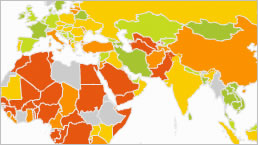Report | Nov 25, 2013
The G20 recognizes data and measurement as an essential foundation for advancing financial inclusion at a global level. This report highlights the key findings and recommendations that emerged during the GPFI Data and Measurement Subgroup’s first working year. The report provides the results of the financial inclusion data stocktaking and gap analysis, highlights the key recent developments that are relevant for diagnosing and tracking financial inclusion, including the “Core Set” of indicators, and provides initial analytical approaches to bottom up target setting to inform the road ahead. The recommendations, emerging based on the key findings and the advanced dialogue on the data challenge, are relevant at the global level, including both G20 and non-G20 countries.
Report | Nov 19, 2013
In line with our corporate priorities on the need to devote special attention to the issue of women entrepreneurship, IFC produced a report focusing on the issues impeding access to finance as well as non-financial barriers for women entrepreneurs, highlighting key trends and challenges, and scrutinizing opportunities for increased access. Scalable approaches to increase access to finance for women entrepreneurs in developing countries were identified, and policy recommendations on empowering women entrepreneurs to pursue economic opportunities, invest additional capital, and hire more employees were provided.
Report | Nov 19, 2013
Refining the recommendations made in the 2010 stocktaking report, IFC developed a comprehensive SME Finance Policy Guide intended as a reference point for governments and regulators to underpin the development of Financial Inclusion Strategies and SME Finance Action Plans. The guide aims at covering all the focal areas of the Subgroup (women-owned SMEs, SMEs in the agricultural sector, SMEs in LDCs); fed by a wide consultation process, it set out models and presented good practice for policy and legal reforms, financial infrastructure, and public interventions, thereby providing a roadmap for planning, assessing and implementing policy and legal measures to support SME access to finance and laying the groundwork for future country level engagement.
Report | Nov 19, 2013
The development of SME Finance in the agricultural sector was also identified as an important issue to bring forward food security and to reach the Millennium Development Goals. IFC conducted analytical work with the objective of identifying appropriate approaches to calculate or reduce the main risks and costs that inhibit access to financial services in the agricultural sector in developing countries. A stocktaking exercise was conducted on approximately 60 case studies and an outreach process was initiated, especially with African partner countries, supported by the Partnership “Making Finance Work for Africa”. This effort led to a report presenting several guidelines for policy and regulatory frameworks conducive to agricultural finance.
Report | Nov 15, 2013
One of the obstacles to more effective financial inclusion is that the international standards that guide the delivery of financial services were originally conceived for developed countries. Yet the practical realities in developing countries, which are home to an estimated 90% of the world’s financially excluded, are very different. This report, published by the Alliance for Financial Inclusion in its capacity as Implementing Partner of the GPFI, highlights how international standards and their application can be improved to accommodate these differences, based on an analysis of five countries: Brazil, Kenya, Mexico, the Philippines and South Africa.
Report | Nov 15, 2013
This case study highlights the experience of Brazil in implementing international standards in the financial sector and the interaction, where relevent, with the topic of financial inclusion. The case study aims to tell the story of Brazil's engagement with each of the standard-setting bodies (SSBs) and to highlight areas where further engagement from the SSBs on the topic of financial inclusion will be welcomed.
Report | Nov 15, 2013
This case study highlights the experience of Kenya in implementing international standards in the financial sector and the interaction, where relevant, with the topic of financial inclusion. The case study aims to tell the story of Kenya's engagement with each of the standard-setting bodies (SSBs) and to highlight areas where further engagement from the SSBs on the topic of financial inclusion will be welcomed.
Report | Nov 15, 2013
This case study highlights the experience of Mexico in implementing international standards in the financial sector and the interaction, where relevant, with the topic of financial inclusion. The case study aims to tell the story of Mexico's engagement with each of the standard-setting bodies (SSBs) and to highlight areas where further engagement from the SSBs on the topic of financial inclusion will be welcomed.
Report | Nov 15, 2013
This case study highlights the experience of the Philippines in implementing international standards in the financial sector and the interaction, where relevant, with the topic of financial inclusion. The case study aims to tell the story of the Philippines' engagement with each of the standard-setting bodies (SSBs) and to highlight areas where further engagement from the SSBs on the topic of financial inclusion will be welcomed.
Report | Nov 15, 2013
This case study highlights the experience of South Africa in implementing international standards in the financial sector and the interaction, where relevant, with the topic of financial inclusion. The case study aims to tell the story of South Africa's engagement with each of the standard-setting bodies (SSBs) and to highlight areas where further engagement from the SSBs on the topic of financial inclusion will be welcomed.


